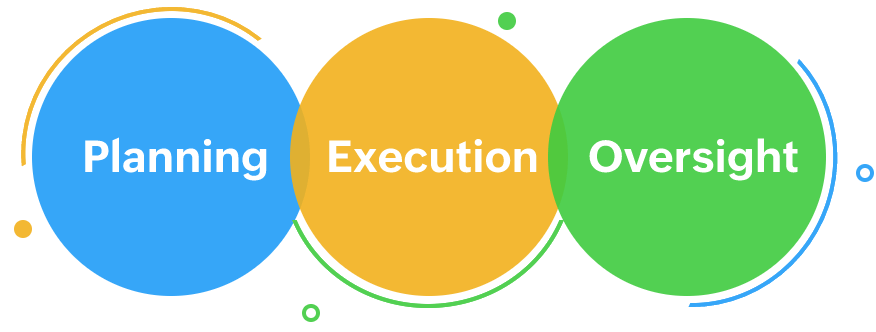What is the purpose of contract administration?
The core purpose of contract administration is to strategize and create solid contracts that benefit everyone involved. From selecting the right counterparts to establishing fair agreements and managing financial aspects, the contract administration process covers critical areas that significantly impact business success.
Key responsibilities include:
- Facilitating effective communication between parties.
- Controlling contract-related costs.
- Optimizing financial outcomes.
- Mitigating risks associated with contracts.
What are the key components of contract administration?
The contract administration process comprises three phases:
- Understand the wants and needs of all parties involved in the contract.
- Collaborate with internal teams to prepare comprehensive bid and pre-qualification documents for partner evaluation.
- Ensure bid requests accurately reflect project specifications and needs. Specify contract inclusions, exclusions, work scope, and deliverables clearly.
- Develop execution strategies based on the deal type and allocate required resources.
- Map out detailed timelines for contracting milestones, such as contract start and end dates, deliverable deadlines, and progress updates.
- Engage in bid evaluations to assess how well potential partners align with deal requirements.
- Conduct compliance checks to ensure potential partners adhere to legal and regulatory requirements. Additionally, perform risk assessments to mitigate potential risks associated with chosen partners.
- Document and share detailed information about the project/transaction to facilitate accurate authoring, encompassing all terms, conditions, and expectations.
- Participate in contract negotiations, leveraging financial expertise to secure favorable terms.
- Monitor funds to allocate budgets accurately, prevent overspending, and maintain financial health.
- Regularly track progress of contractual obligations against set timelines for compliance and address deviations promptly.
- Stay prepared for unexpected outcomes and have risk response plans to handle potential challenges.
- Conduct smooth contract close-outs by settling tasks and financial matters.
The difference between contract administration and contract management
While the terms contract administration and contract management are often used interchangeably, they denote two different aspects in the contracting process.
Contract Administration
Contract Management
Contract administration deals with the planning and execution of contracts until they're signed.
Contract management, on the other hand, refers to actions that start after the contract has been awarded.
The key responsibilities involve identifying potential partners, negotiating contract details, and setting clear expectations for the agreement.
In contract management, the key responsibilities include tracking contract performance, managing contract changes, and ensuring the smooth execution of contractual obligations.
The primary goal of contract administration is to facilitate effective communication between parties, control contract-related costs, and optimize financial outcomes while creating mutually beneficial contracts.
The primary goal of contract management is to ensure seamless contract progress through all lifecycle stages, with improved compliance and efficiency. Additionally, it aims to enhance security and maximize value realization through periodic contract audits and analytics.
How does contract management software simplify contract administration?
There are contract management tools with varying levels of sophistication for legal teams today. These software solutions often come with features that help both contract administration and contract management.
Contract management software is a game-changer in modernizing and streamlining the contract administration process. It equips contract administrators with advanced features, enabling a smooth contract administration process that reduces manual work and improves efficiency. Here are some contract management software capabilities and their benefits in the contract administration process.
Centralized contract repository
Enables easy access to critical contract information whenever required. This improves visibility and control.
Counterparty management
With the capability of storing all counterparty details in a single place, administrators can efficiently handle counterparty relations. Further, by anonymizing personal data and temporarily stopping data processing, they can ensure compliance and data protection.
Real-time collaboration capabilities
Establishes seamless communication between parties.
Role-based access control
Allows assigning specific roles and permissions to users, ensuring controlled access to contract data while enhancing transparency and accountability.
Document version control
Simplifies contract version tracking, ensuring a clear record of contract history and changes.
Integrations and APIs
Facilitates smooth integration with internal applications like CRM and ERP, enhancing efficiency and enabling data exchange.
Dashboard and reports
Helps with a high-level overview of business contracts and valuable insights to make informed decisions.
What are the benefits of streamlined contract administration?
Cost savings:Streamlined contract administration enables close monitoring of both technical and commercial aspects of contracts. This empowers contract administrators to identify cost-saving opportunities and negotiate favorable terms.
Risk management: In a well-defined contract administration process, critical contracts pass through an approval process before they are executed. Including important stakeholders and contract administrators in this process ensures no opportunity or risk is overlooked. This helps businesses seize opportunities and prevent potential problems.
Improved accountability: Improved visibility into all contract-related activities and structured process frameworks help contract administrators ensure that everyone meets their obligations and identify any potential deviations from the agreed-upon terms. This enables them to hold parties accountable and makes contract management much smoother.
Strategic decision-making: Access to real-time contract data equips contract administrators to make informed decisions, identify trends, and capitalize on opportunities that contribute to business growth and success. This helps them stay responsive in a fast-paced business environment.
Stronger business relationships: Streamlined contract administration fosters trust, transparency, and clear communication among parties, leading to stronger and long-term business relationships.







